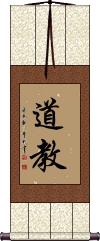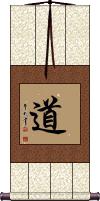Many custom options...
And formats...

Daoism in Chinese / Japanese...
Buy a Daoism calligraphy wall scroll here!
Personalize your custom “Daoism” project by clicking the button next to your favorite “Daoism” title below...
Daoism / Taoism
道教 is the title often used in both Chinese and Japanese to describe the beliefs or religion of Taoism / Daoism.
The first character is simply “dao” and the second character can be translated as “teachings,” “faith” or “doctrine.”
Daoism / Taoism
Literally: The Way or Road
道 is the character “dao” which is sometimes written as “tao” but pronounced like “dow” in Mandarin.
道 is the base of what is known as “Taoism.” If you translate this literally, it can mean “the way” or “the path.”
Dao is believed to be that which flows through all things and keeps them in balance. It incorporates the ideas of yin and yang (e.g. there would be no love without hate, no light without dark, no male without female.)
The beginning of Taoism can be traced to a mystical man named
Lao Zi (604-531 BC), who followed, and added to the teachings of Confucius.
More about Taoism / Daoism here.
Note that this is pronounced “dou” and sometimes “michi” when written alone in Japanese but pronounced “do” in word compounds such as Karate-do and Bushido. It's also “do” in Korean.
Alternate translations and meanings: road, way, path; truth, principle province.
Important Japanese note: In Japanese, this will generally be read with the road, way, or path meaning. Taoism is not as popular or well-known in Japan so Daoist/Taoist philosophy is not the first thing a Japanese person will think of when they read this character.
See our Taoism Page
Not the results for daoism that you were looking for?
Below are some entries from our dictionary that may match your daoism search...
| Characters If shown, 2nd row is Simp. Chinese |
Pronunciation Romanization |
Simple Dictionary Definition |
道 see styles |
dào dao4 tao wataru わたる |
More info & calligraphy: Daoism / Taoism(1) (abbreviation) (See 道・みち・1) road; path; street; route; (2) (See 道・みち・5) way; set of practices; rules for conducting oneself; (3) (abbreviation) (in Japanese schools) (See 道徳教育) moral education; (4) Buddhist teachings; (5) Taoism; (6) administrative region of Japan (Hokkaido); (7) (hist) administrative region of Japan (Tokaido, Tosando, etc.); (8) province (administrative region of Korea); (9) circuit (administrative region of China); (10) (hist) province (Tang-era administrative region of China); (personal name) Wataru mārga. A way, road; the right path; principle, Truth, Reason, Logos, Cosmic energy; to lead; to say. The way of transmigration by which one arrives at a good or bad existence; any of the six gati, or paths of destiny. The way of bodhi, or enlightenment leading to nirvāṇa through spiritual stages. Essential nirvāṇa, in which absolute freedom reigns. For the eightfold noble path v. 八聖道.; The two Ways: (1) (a) 無礙道 or 無間道 The open or unhindered way, or the way of removing all obstacles or intervention, i. e. all delusion; (b) 解脫道 the way of release, by realization of truth. (2) (a) 難行道 The hard way of "works", i. e. by the six pāramitā and the disciplines. (b) 易行道 the easy way salvation, by the invocation of Amitābha. (3) (a) 有漏道 The way of reincarnation or mortality; (b) 無漏 the enlightened way of escape from the miseries of transmigration. (4) (a) 教道 The way of instruction; (b) 證道 the way of realization. (5) The two lower excretory organs. |
三魂 see styles |
sān hún san1 hun2 san hun |
More info & calligraphy: Three Souls |
修行 see styles |
xiū xíng xiu1 xing2 hsiu hsing nobuyuki のぶゆき |
More info & calligraphy: Shugyo(noun, transitive verb) (1) training; practice; discipline; study; (noun, transitive verb) (2) {Buddh} ascetic practices; (personal name) Nobuyuki caryā, conduct; to observe and do; to end one's ways; to cultivate oneself in right practice; be religious, or pious. |
玄武 see styles |
xuán wǔ xuan2 wu3 hsüan wu genbu; genmu げんぶ; げんむ |
More info & calligraphy: Xuan Wu / Genbu / Black Tortoise God(1) (See 四神) Black Tortoise (god said to rule over the northern heavens); (2) {astron} (See 二十八宿) seven mansions (Chinese constellations) of the northern heavens; (personal name) Hirotake |
道教 see styles |
dào jiào dao4 jiao4 tao chiao michinori みちのり |
More info & calligraphy: Daoism / TaoismTaoism; Daoism; (personal name) Michinori Taoism. The teaching of the right way, i.e. of Buddhism. |
道德經 道德经 see styles |
dào dé jīng dao4 de2 jing1 tao te ching Dōtoku kyō |
More info & calligraphy: Daodejing / Tao Te ChingDaode jing |
炁 see styles |
qì qi4 ch`i chi |
(Daoism) Qi; vital force; life force (variant of 氣|气[qi4]) |
玄 see styles |
xuán xuan2 hsüan fukashi ふかし |
black; mysterious (given name) Fukashi Dark, sombre, black; abstruse, obscure, deep, profound; hence it is used to indicate Daoism, and was afterwards adopted by the Buddhists. |
七魄 see styles |
qī pò qi1 po4 ch`i p`o chi po |
seven mortal forms in Daoism, representing carnal life and desires; contrasted with 三魂 three immortal souls |
三教 see styles |
sān jiào san1 jiao4 san chiao mitsunori みつのり |
the Three Doctrines (Daoism, Confucianism, Buddhism) (1) Shinto, Buddhism and Confucianism; the three religions; (2) Confucianism, Buddhism and Taoism; (3) Buddhism, Shinto and Christianity; (given name) Mitsunori The three teachings, i.e. 儒, 佛 (or 釋), and 道Confucianism, Buddhism, and Taoism; or, 孔, 老, 釋 Confucianism, Taoism (aIso known as 神敎), and Buddhism. In Japan they are Shinto, Confucianism, and Buddhism. In Buddhism the term is applied to the three periods of Śākyamuni's own teaching, of which there are several definitions: (1) The Jiangnan 南中 School describe his teaching as (a) 漸progressive or gradual; (b) 頓 immediate, i.e. as one whole, especially in the 華嚴經; and (c) 不定 or indeterminate. (2) 光統 Guangtong, a writer of the Iater Wei dynasty, describes the three as (a) 漸 progressive for beginners, i.e. from impermanence to permanence, from the void to reality, etc.; (b) 頓 immediate for the more advanced; and (c) 圓complete, to the most advanced, i.e. the Huayan as above. (3) The 三時敎q.v. (4) The 南山 Southern school deals with (a) the 性空of Hīnayāna; (b) 相空of Mahāyāna; and (c) 唯識圓 the perfect idealism. v. 行事鈔中 4. Tiantai accepts the division of 漸, 頓, and 不定 for pre-Lotus teaching, but adopts 漸 gradual, 頓 immediate, and 圓 perfect, with the Lotus as the perfect teaching; it also has the division of 三藏敎 , 通敎 , and 別敎 q.v. |
乩童 see styles |
jī tóng ji1 tong2 chi t`ung chi tung |
(Daoism) a spirit medium, often a young person, believed to be possessed by a deity during rituals, acting as an intermediary for communication between the spirit world and humans |
修道 see styles |
xiū dào xiu1 dao4 hsiu tao nagamichi ながみち |
to practice Daoism (n,vs,vi) learning; studying the fine arts; (given name) Nagamichi To cultivate the way of religion; be religious; the way of self-cultivation. In the Hīnayāna the stage from anāgāmin to arhat; in Mahāyāna one of the bodhisattva stages. |
太陰 太阴 see styles |
tài yīn tai4 yin1 t`ai yin tai yin taiin / tain たいいん |
the Moon (esp. in Daoism) (1) (See 太陽) Moon; (2) (See 小陰) the greater yin (in yin-yang) |
普渡 see styles |
pǔ dù pu3 du4 p`u tu pu tu futo |
(Buddhism, Daoism) to deliver all sentient beings from suffering; (Tw) a ritual of making offerings, esp. to wandering spirits rather than gods or ancestors (abbr. for 中元普渡[zhong1 yuan2 pu3 du4]) Universally to ferry across. |
法寶 法宝 see styles |
fǎ bǎo fa3 bao3 fa pao houbou / hobo ほうぼう |
Buddha's teaching; Buddhist monk's apparel, staff etc; (Daoism) magic weapon; talisman; fig. specially effective device; magic wand (personal name) Houbou Dharmaratna. (1) Dharma-treasure, i. e. the Law or Buddha-truth, the second personification in the triratna 三寶. (2) The personal articles of a monk or nun— robe, almsbowl, etc. |
玄機 玄机 see styles |
xuán jī xuan2 ji1 hsüan chi genki げんき |
profound theory (in Daoism and Buddhism); mysterious principles (personal name) Genki |
祿星 禄星 see styles |
lù xīng lu4 xing1 lu hsing |
Star God of Rank and Affluence (Daoism) |
科儀 科仪 see styles |
kē yí ke1 yi2 k`o i ko i kagi |
ritual (Daoism); scientific instrument (abbr. for 科學儀器|科学仪器[ke1 xue2 yi2 qi4]) The rule of the lesson. |
罡風 罡风 see styles |
gāng fēng gang1 feng1 kang feng |
in Daoism, astral wind on which immortals may ride; strong wind |
羽化 see styles |
yǔ huà yu3 hua4 yü hua uka うか |
levitation (of Daoist immortal); to become as light as a feather and ascend to heaven; (in Daoism) to become immortal; to die; of winged insects, to emerge from the cocoon in adult form; eclosion (n,vs,vi) {zool} emergence (of insects); eclosion; growing wings; (surname) Uka |
老莊 老庄 see styles |
lǎo zhuāng lao3 zhuang1 lao chuang Rō-Sō |
Laozi and Zhuangzi (or Lao-tze and Chuang-tze), the founders of Daoism Laozi and Zhuangzi |
諸子 诸子 see styles |
zhū zǐ zhu1 zi3 chu tzu moroko もろこ |
various sages; refers to the classical schools of thought, e.g. Confucianism 儒[ru2] represented by Confucius 孔子[Kong3 zi3] and Mencius 孟子[Meng4 zi3], Daoism 道[dao4] by Laozi 老子[Lao3 zi3] and Zhuangzi 莊子|庄子[Zhuang1 zi3], Mohism 墨[mo4] by Mozi 墨子[Mo4 zi3], Legalism 法[fa3] by Sunzi 孫子|孙子[Sun1 zi3] and Han Feizi 韓非子|韩非子[Han2 Fei1 zi3], and numerous others (1) (kana only) gudgeon (any fish of genus Gnathopogon or related genera); (2) (See 本諸子) willow gudgeon (Gnathopogon caerulescens); (3) (See 九絵) longtooth grouper (species of fish, Epinephelus bruneus); (surname, female given name) Moroko children |
道學 道学 see styles |
dào xué dao4 xue2 tao hsüeh |
Confucian study of ethics; study of Daoism; school for Daoism in Tang and Song times; Daoist magic; another name for 理學|理学, rational learning of Song dynasty neo-Confucianism See: 道学 |
飛升 飞升 see styles |
fēi shēng fei1 sheng1 fei sheng |
to fly upwards; (fig.) to rise; to increase; (Daoism) to ascend to heaven; to achieve immortality |
黃老 see styles |
huáng lǎo huang2 lao3 huang lao |
Daoism |
道教徒 see styles |
dào jiào tú dao4 jiao4 tu2 tao chiao t`u tao chiao tu |
a Daoist; a follower of Daoism |
風火輪 风火轮 see styles |
fēng huǒ lún feng1 huo3 lun2 feng huo lun |
(martial arts) wind-and-fire wheel, weapon used in hand-to-hand fighting; (Daoism) a magical pair of wheels on which one can stand to ride at great speed, used by Nezha 哪吒[Ne2 zha5]; (fig.) never-ending treadmill |
騎鶴化 骑鹤化 see styles |
qí hè huà qi2 he4 hua4 ch`i ho hua chi ho hua |
(Daoism) to die |
黃庭經 黄庭经 see styles |
huáng tíng jīng huang2 ting2 jing1 huang t`ing ching huang ting ching |
Huangting Jing, one of the primary scriptures of Daoism |
三官大帝 see styles |
sān guān dà dì san1 guan1 da4 di4 san kuan ta ti |
the three gods in charge of heaven, earth and water (Daoism) |
Click here for more daoism results from our dictionary
The following table may be helpful for those studying Chinese or Japanese...
| Title | Characters | Romaji (Romanized Japanese) | Various forms of Romanized Chinese | |
| Daoism Taoism | 道教 | doukyou / dokyo | dào jiào / dao4 jiao4 / dao jiao / daojiao | tao chiao / taochiao |
| Daoism Taoism | 道 | michi / -do | dào / dao4 / dao | tao |
Successful Chinese Character and Japanese Kanji calligraphy searches within the last few hours...





